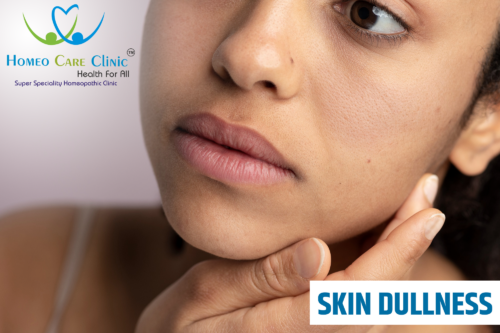Definition
Skin dullness refers to a lack of radiance, brightness, or a healthy glow in the skin’s appearance. It often manifests as a tired or lackluster complexion. Dull skin may appear flat, rough, or uneven in texture, and it can make a person look older or less vibrant.
Causes of Skin Dullness
- Dead Skin Cells: Accumulation of dead skin cells on the skin’s surface can lead to dullness. These cells can block light reflection and make the skin appear lackluster.
- Dehydration: Insufficient hydration can cause the skin to lose its plumpness and radiance. When skin lacks moisture, it may look dry, flaky, and dull.
- Aging: As we age, the skin’s natural exfoliation process slows down, leading to a build-up of dead skin cells and a decrease in collagen and elastin production. These factors contribute to skin dullness.
- Environmental Factors: Exposure to harsh weather conditions, pollution, and UV radiation can damage the skin and lead to dullness over time.
- Poor Diet: A diet lacking essential nutrients, especially vitamins and antioxidants, can impact skin health and contribute to dullness.
- Lifestyle Factors: Smoking, excessive alcohol consumption, and lack of sleep can negatively affect skin health and contribute to dullness.
- Stress: Chronic stress can lead to hormonal imbalances, which may affect the skin’s appearance and contribute to dullness.
Types of Skin Dullness
- Surface Dullness: This type of dullness is mainly due to the accumulation of dead skin cells on the skin’s surface. It can often be addressed with exfoliation and proper skincare.
- Dehydration-Related Dullness: When the skin lacks moisture, it can appear dull and rough. Using hydrating skincare products and drinking enough water can help combat this type of dullness.
- Environmental Dullness: Exposure to environmental pollutants and UV radiation can lead to oxidative stress and damage to the skin, resulting in dullness. Sunscreen and antioxidant-rich skincare products can provide some protection.
- Age-Related Dullness: As people age, their skin naturally becomes less vibrant due to a decrease in collagen and elastin production. Anti-aging skincare routines can help combat age-related dullness.
Procedures and Products to Address Skin Dullness
- Exfoliation: Regular exfoliation with products containing alpha hydroxy acids (AHAs) or beta hydroxy acids (BHAs) can help remove dead skin cells and improve skin texture.
- Hydration: Use moisturizers and serums with ingredients like hyaluronic acid to keep the skin well-hydrated.
- Sun Protection: Apply broad-spectrum sunscreen daily to protect your skin from UV damage and prevent environmental dullness.
- Antioxidants: Incorporate skincare products with antioxidants like vitamin C and E to combat free radical damage caused by environmental factors.
- Retinoids: Topical retinoids can promote collagen production, improve skin texture, and reduce the appearance of dullness, especially for age-related concerns.
- Chemical Peels: Professional chemical peels can provide deeper exfoliation and address more severe cases of surface dullness. These should be done by a trained cosmetologist. And use for skin dullness
Superficial or Light Peels
- Chemicals Used: These peels use mild acids like alpha hydroxy acids (AHAs) or beta hydroxy acids (BHAs) such as glycolic acid, salicylic acid or lactic acid.
- Depth of Penetration: They penetrate only the outermost layer of the skin (epidermis).
- Skin Types: Superficial peels are suitable for most skin types, including sensitive skin.
Uses of Chemical Peel
- Salicylic Peel
- Uses: Salicylic acid is a beta hydroxy acid (BHA) that is particularly effective at exfoliating the skin and treating acne-related issues. It penetrates into the pores, helping to unclog them and reduce blackheads and whiteheads. It can also help with mild to moderate acne and acne scars. Additionally, it has anti-inflammatory properties, making it suitable for sensitive and acne-prone skin.
- Skin Type: Salicylic peels are most suitable for oily, acne-prone, and combination skin types.
- Glycolic Peel
- Uses: Glycolic acid is an alpha hydroxy acid (AHA) that is excellent for exfoliating the skin, improving skin texture, and promoting collagen production. It is help to reduce the entrance of fine lines, wrinkles, and age spots. Glycolic peels can also improve the overall brightness and tone of the skin.
- Skin Type: Glycolic peels are suitable for most skin types, especially those with aging concerns, sun-damaged skin, and uneven texture.
- Azelaic Peel
- Uses: Azelaic acid is a dicarboxylic acid that has anti-inflammatory and antimicrobial properties. Azelaic peels are used to treat conditions like rosacea, acne and hyperpigmentation. It can help reduce redness, inflammation, and the appearance of dark spots on the skin.
- Skin Type: Azelaic peels are suitable for individuals with sensitive or acne-prone skin, especially those with rosacea or post-inflammatory hyperpigmentation. It can also benefit those with melasma or uneven skin tone.
It’s important to note that chemical peels should be used under the guidance of a skincare professional or cosmetology.
Uses: They can improve skin texture, reduce mild acne scars, minimize fine lines and wrinkles, and enhance skin tone and brightness.
Lifestyle Changes: Maintaining a balanced diet, staying hydrated, managing stress, getting adequate sleep, and avoiding smoking and excessive alcohol can all contribute to healthier-looking skin.
Dr. Vaseem Choudhary’s “Homeo Care Clinic” – Your Personalized Skin Solution
Dr. Vaseem Choudhary’s Homeo Care Clinic in Pune is well-known for its expertise in chemical peeling treatment, here’s why they stand out:
- Experienced Team: Dr. Vaseem Choudhary’s clinic boasts a team of experienced practitioners knowledgeable in skin’s procedures.
- Personalized Treatment Plans: Each patient receives a customized treatment plan tailored to their unique skin type and depth of skin pigmentation.
- Authentic Results: Homeo Care Clinic is known for delivering reliable results, confirming that patients leave with a clear canvas.







